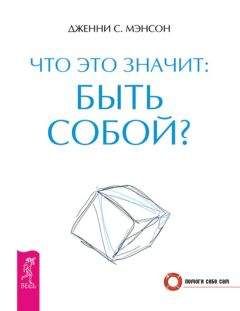Пол Экман - Мудрость Востока и Запада. Психология равновесия
22
Под «пробуждением разума» понимается альтруистическое желание достичь просветления ради всех чувствующих существ.
23
Другой заменой слова «неведением» которая, возможно, лучше передает то, что вкладывают в него буддисты, является слово «недопонимание».
24
Некоторые критические высказывания в адрес других стран не приводятся по дипломатическим соображениям.
25
Четыре благородные истины — о природе страдания (дуккха), о происхождении страдания (самудайа), о прекращении страдания (ниродха) и о пути к прекращению страдания (магга) — относятся к числу важнейших буддистских доктрин. Позднее, в ходе дискуссии о выработке глобального сострадания, Далай-лама рассказал об их роли подробнее.
26
Начальных действий по ослаблению чужого страдания проще добиться, чем регулярной поддержки, которая так часто оказывается необходимой, потому что она может потребовать определенных жертв.
27
Гайдусек изучал, каким образом распространяется болезнь центральной нервной системы, получившая название куру. Для проведения своих исследований он разбил палаточный лагерь, оборудованный всем необходимым. куда пригласил и меня. Позднее за сделанное им открытие Гайдусек был удостоен Нобелевской премии. Он установил, что куру заболевали те местные жители, которые поедали мозг своих соплеменников, умерших от этой болезни.
28
Дик Грейс является филантропом, ежегодно вручающим почетные награды людям со всего мира, которые, по его мнению, ведут жизнь, исполненную сострадания. Они приглашаются в Сан-Франциско, где проходит публичная церемония награждения, и получают приветствие от Далай-ламы.
29
Сначала я описывал это как «гимнастику сострадания», но тренировка, необходимая для выработки сострадания, подразумевает другие психические процессы.
30
Я не счел нужным напоминать о моей теории, согласно которой возникшая эмоция не отражает различий в том, как она была приведена в действие, например выражение лица у человека, читающего об акте насилия, и выражение лица у человека, слушающего рассказ об этом акте насилия от другого человека. С учетом этой теории не выглядит удивительным, что деятельность мозга будет одинаковой независимо от того, чем она была вызвана.
КОММЕНТАРИИ
1
Daniel Goleman, Destructive Emotions (New York: Bantam Books, 2003).
2
His works include The Monk and the Philosopher: A Father and Son Discuss the Meaning of Life (New York: Schocken Books, 1999), by Ricard's father, Jean-Francois Revel, and Ricard; Happiness: A Guide to Developing Life's Most Important Skill (New York: Little, Brown, 2006), by Ricard; and Ricard's books of photography.
3
Paul Ekman, Wallace V Friesen, and Ronald C. Simons, «Is the Startle Reaction an Emotion?» Journal of Personality and Social Psychology, vol 4995 (1985): 1416-26.
4
Я благодарю Эрику Розенберг, Клиффа Сейрона, Маргарет Каллен, Шарон Медрик и психиатра из «Marin» за то, что чаще всех посещали прослушивания, проводившиеся на протяжении года.
5
Желающие услышать всю тридцатидевятичасовую запись наших бесед, включая и то, что было сказано по-тибетски, могут сделать это на paulekman.com
6
Paul Ekman. Emotions Revealed: Recognizing Faces and Feelings to Improve Communication and Emotional Life (New York: Owl Books, 2007).
7
Ibid., pp. 39–40.
8
See E, Diener, «Subjective Well-Being: The Science of Happiness and a Proposal for a National Index», American Psychologist, 55 (2000): 34–43; D. G. Myer, «The Funds, Friends, and Faith of Happy People», American Psychologist, 55 (2000): 56–67.
9
Dalai Lama, The Universe in a Single Atom (New York: Broadway Books, 2005).
10
Helena Cronin, The Ant and the Peacock: Altruism and Sex Selection from Darwin to Today (London: Cambridge University Press, 1991)
11
Oliver Curry, «Morality as Natural History: An Adaptionist Account of Ethics», unpublished dissertation, London School of Economics, 2005.
12
B. Alan Wallace, Contemplative Science: Where Buddhism and Neuroscience Converge (New York: Columbia University Press, 2007).
13
Paul Ekman. Richard J. Davidson, Matthieu Ricard, and B. Alan Wallace, «Buddhist and Psychological Perspectives on Emotions and WeilBeing», Current Directions in Psychological Science, 14, no. 2 (2005): 59–63.
14
Paul Ekman, «All Emotions Are Basic», in Paul Ekman and Richard J. Davidson, eds., The Nature of Emotion (New York: Oxford University Press, 1994).
15
See chapter 4 in Emotions Revealed for a fuller discussion of this matter. Paul Ekman, Emotions Revealed, rev. ed. (New York: Owl Books, 2007).
16
Я благодарен Джонатану Шулеру за этот пример.
17
Personal communication from Steven Souci, National Institute of Mental Health, 1980.
18
First reported in Paul Ekman, Robert W Levenson, and Wallace V Friesen, «Autonomic, Nervous System Activity Distinguishes Between Emotions», Science, 221 (1983): 1208-10.
19
Described in Daniel G. Freedman, Human Sociobiology: A Holistic Approach (New York: Free Press, 1979), and Daniel G, Freedman, Human Infancy: An Evolutionary Perspective (New York: John Wiley & Sons, 1975).
20
«Emotional Profiles», http://www.paulekman.com.
21
Dalai Lama, The Universe in a Single Atom: The Convergence of Science and Spirituality (New York: Broadway Books, 2005), p. 178.
22
Thich Nhat Hanh, The Miracle of Mindfulness (Boston: Beacon Press, 1975). P 14-
23
Jon Kabat-Zinn, Coming to Our Senses: Healing Ourselves and the World Through Mindfulness (London: Piatkus Books, 2005). P. 108.
24
Jack Kornfield, «Finding My Religion», San Francisco Chronicle, November 28,2005.
25
Nyanaponika Thera, The Heart of Buddhist Meditation (York Beach, Me.: Samuel Weiser, 1988). Originally published 1956.
26
«Mindfulness: The Heart of Buddhist Meditation? A Conversation with Jan Chozen Bays, Joseph Goldstein, Jon Kabat-Zinn, and Alan Wallace», Inquiring Mind: A Semiannual Journal of the Vipassana Community, 22, no. 2 (Spring 2006): 5.
27
Bhikkhu Bodhi, ed., A Comprehensive Manual of Abhidhamma: The Abidhammattha Sangaha (Kandy, Sri Lanka: Buddhist Publication Society, 1993). P. 86.
28
Thera, Heart of Buddhist Meditation, p. 9.
29
Ibid.
30
Ibid., p. 6.
31
Paul Ekman, Telling Lies, rev. ed. (New York: W. W. Norton, 2002).
32
Paul Ekman, Robert W Levenson, and Wallace Friesen, «Autonomic Nervous System Activity Distinguishes Between Emotions», Science, 221 (1983): 1208-10; Robert W. Levenson, Paul Ekman, and Wallace Friesen, «Voluntary Facial Action Generates Emotion-specific Autonomic Nervous System Activity», Psychophysiology, 27 (1990): 363-84; Paul Ekman and Richard J. Davidson, «Voluntary Smiling Changes Regional Brain Activity», Psychological Science, 4 (1993): 342-45.
33
Paul Ekman, Emotions Revealed, rev. ed. (New York: Owl Books, 2007), p. 39.
34
Harry Stack Sullivan, Interpersonal Psychiatry (New York: W W Norton, 1953).
35
Kunzang Pelden, The Nectar of Manjushris Speech: A Detailed Commentary on Shantidevafs Way of the Bodhisattva, translated by Padmakara Translation Group (Boston: Shambhala Publications, 2007), chapter 4.
36
Silvan S. Tomkins, Affect, Imagery, Consciousness (New York: Springer, 1962–1963).
37
М. Е. Kemeny С. Foltz, P. Ekman, and P. Jennings, «Contemplative / Emotion Training Improves Emotional Life» (in press).
38
The psychologist John Gottman discovered this. See L. L. Carstensen, J. M. Gottman, and R. W Levenson, «Emotional Behavior in Long-Term Marriage», Psychology and Aging, 10, no. 1 (1995): 140-49.
39
Shanti Deva, A Guide to the Boddhisattva Way of Life, translated by Vesna A. Wallace and B. Alan Wallace (Ithaca, N.Y.: Snow Lion Publications, 1997).
40
An example of this can be seen in Heleen A. Slagter, Antoine Lutz, Lawrence L. Greischar, et al., «Mental Training Affects Distribution of Limited Brain Resources», PLoS Biology, 5, no. 6 (2007): e138, doi:io.i37i/journal.pbio.0050138.
41
The Dalai Lama and Victor Chan, The Wisdom of Forgiveness: Intimate Journeys and Conversations (New York: Riverhead Books, 2004), p. no.
42
Stone Mountain Zendo, http://www.stonemountainzendo.org/textsbodhisattva.html.
43
Geshe Sonam Rinchen, The Bodhisattva Vow, translated and edited by Ruth Sonam (Ithaca, N.Y.: Snow Lion Publications, 2000).
44
Я благодарен Клиффу Сейроыу за это предположение.
45
Emotion researchers do not completely agree about the definition of anger. I have theorized that anger is triggered by a perceived block to a desired goal that may or may not involve a wish to harm the person responsible for the obstacle.
46
Arne Ohman, «Fear and Anxiety as Emotional Phenomena: Clinical Phenomenology, Evolutionary Perspectives, and Information Processing», in M. Lewis and J. Haviland, eds., The Handbook of Emotions (New York: Guilford Press, 1993), pp. 511-36.
47
This change in view occurred between March and June 2007.




